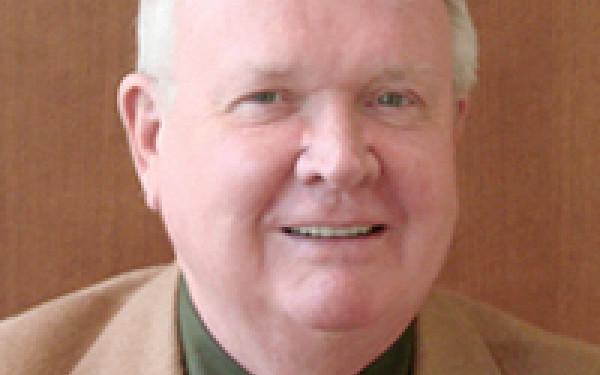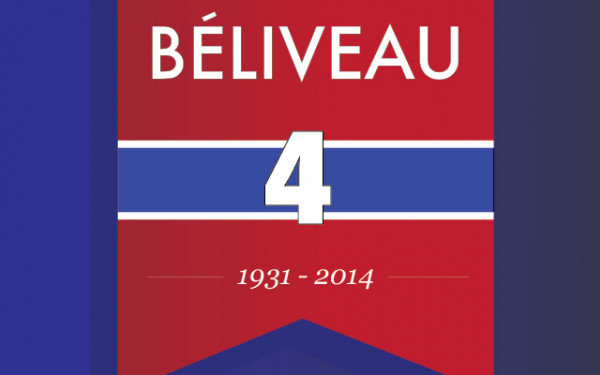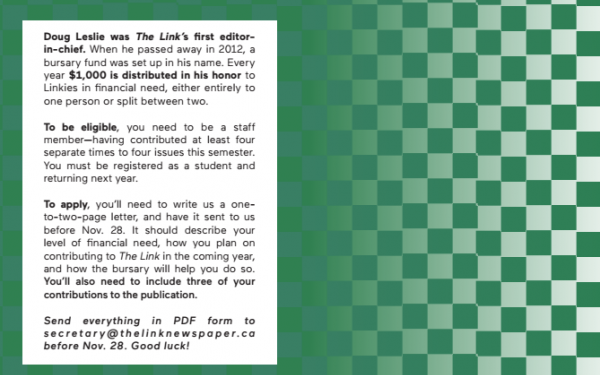Remembering Doug Leslie
A Tribute to The Link’s Founding Editor
This Tuesday, we received word that Doug Leslie, The Link’s founding editor, had passed away.
As a very new Editor-in-Chief myself, it was a wake-up call for me. It was a harsh reminder that the extraordinary team behind this newspaper and myself are a tiny part of The Link’s rich history.Leslie took over as the first editor of the union of the Loyola News and The Georgian in 1980, after a bit of cajoling.
That team wrote on their first front page, “With this premier issue of The Link, the changing face of Concordia is reflected.”
Today, we try to keep that spirit alive, covering this diverse and chaotic campus to the best of our ability.
For those of us at The Link, it’s hard to imagine a future without this paper. When you invest yourself so wholly into anything, as so many people at this university do, it’s no longer what you do, but who you are.
One of the incredible lessons we learned in piecing together the life of Doug Leslie, and the life of The Link, is that that feeling never truly goes away.
Editors from 1980—and before—many of whom are professional journalists today, came forward with condolences following the sad news. In the midst of the lead-up to a provincial election, they took a moment out of their professional lives and became Linkies again.
–Julia Wolfe, Editor-in-Chief
Philip Authier, now a reporter for The Gazette, was Leslie’s “second-hand man” and eventual successor. Authier had this to say:
As I recall, Doug was reluctantly coaxed into becoming the first editor by the gang that was leaving, people like Karen McCarthy of Loyola News and Mary Renaud of The Georgian, who did much of the merger negotiations.
That’s because it was a big turnover year. We barely had enough staff for one paper, let alone two.
He got the job. I thus became his number two, the managing editor. It was the right merger year team because Doug was a proud Loyola News man and I was of Georgian stock.
To prove my point I had a look through the 1980 bound volume. The first words on Doug’s first column, Volume 1, Number 1, were, “Frankly, I never thought I’d be doing this.”
The editor had a weekly column then. We published Tuesday and Friday. Doug’s first love was writing and he was a fine one at that.
In that column he kind of became the heart and soul of the new paper, which was—in the early days—beset with organizational problems and was chronically short-staffed. As best he could, he tried to inject a soul into a paper that needed one because it was all so new.
We stumbled along that first year, really stumbled along. We were green and when we panicked, he had something witty or cunning to calm us down.
That was especially true when we fought with the student council to maintain our independence.
Doug, a Loyola News man to the bone, brought that sense of student journalistic duty to the job and together we survived those first months where the student council was breathing down our necks to make a go of it.
We worked together. Being more diplomatic and easy-going than me, Doug found the right language to defend our turf. And that was his editorial style too.
Together we managed to woo our very green staff into shape, but the job was seriously wearing us all down and causing havoc with our studies. This is a common problem on student papers, as you know.
Doug would leave the job by Christmas—I succeeded him—but he was still around to help on special editions, etc. and to do what he loved the most: write.
Many years later, Doug and I had a heart to heart about those years. He said he was happy I succeeded him and kept the place running because it was a year which needed a good organizer. And I said how much I enjoyed working with him, his writing, his character, his fun side. And we all remained good friends to the end. I only wish he had not left us so soon.
As Eric Serre, the production manager that year, recalled this week, Doug had:
The easygoing Chauncey Gardiner style. Nothing aggressive (The movie Being There was popular).
Lise Bissonnette, the news editor at the time, added that Doug was:
A good bridge-builder… He was also lots of fun. When I think of Doug, I think less of newspaper editing and a lot more of long nights singing all the songs we could think of while Doug played guitar and we all drank lots of beer (not necessarily in the newspaper office, but with the newspaper gang).
All of us who spent time there have great memories of that time. That’s what made him an effective bridge between the two, and what contributed to making The Link a fun place to be.
Peggy Curran, current Gazette reporter and Loyola News editor, knew Leslie from before the merger, and worked with him at Loyola. Doug, she says, was:
Charming, fun, with a wicked sense of humour but a kind heart. He had gone to University of New Brunswick for a year but came back to Montreal to go to Loyola. As I remember it, he ran into his childhood friend (and with me, co-editor of the Loyola News) Allan Kunigis on campus and got talked into joining our inner circle of people who pretty much lived in the newspaper office.
Our offices were in a decrepit former apartment building on Sherbrooke St. W., since torn down. There was a claw-foot bathtub perpetually filled with empty beer bottles. At the end of production night, whoever was left would sometimes climb through a transom onto the roof to watch the sun rise.
We ate very badly, either at Mr. Hot Dog (now Dagwood’s) or a place we called John’s. Our joke was that we just had to be talking about someone and they would most certainly be eating in the neighbouring booth.
He was a lovely writer, played the guitar, was a peacemaker when there were squabbles. He made me laugh. He pretended not to take life very seriously, I think because he really did.

_889_539_90.jpg)





